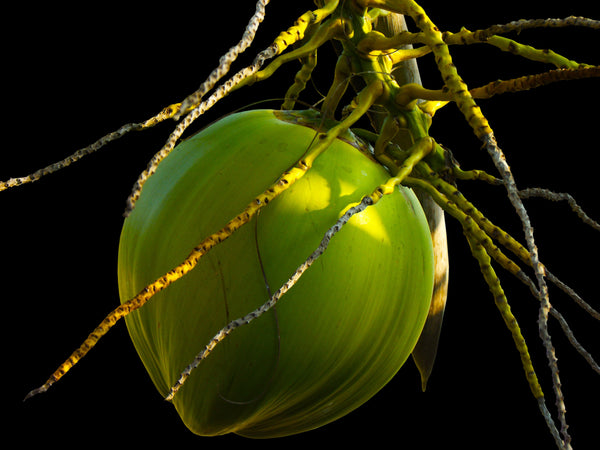With the wide array of information out there on coconut oil these days, I'm not sure how many "new" details I can share with you. But since it’s a base for practically all of my homemade beauty products, I thought it fitting to write my first Ingredient Insights post about the magical wonders of Coconut Oil and why I love it so.
Coconut oil has been used for generations for its endless health and healing benefits. It’s highly comprised of medium chain fatty acids (65%) that are sent straight to the liver to be converted into energy, rather than cholesterol (1). It’s also a great antioxidant, thanks to its resistance to free radical formation (2).
But what exactly gives coconut oil its healing powers?
A bunch of fatty acids (1,2) :)
Lauric Acid (49%): When digested forms monolaurin, which can kill bacteria, viruses, and fungi; hence, coconut oil’s antibacterial, antiviral and antifungal properties! Also reported to raise good cholesterol or HDL.
Caprylic acid (8%) and Myristic acid (18%): Rich in antimicrobial and antifungal properties.
Capric Acid (7%): Reacts with enzymes released by bacteria that transform it into a powerful antimicrobial agent, known as monocaprin.
Linoleic Acid (2%): Although only present in a small amount, when converted by the body, this omega-6 fatty acid helps reduce inflammation and promotes metabolism and bone health.

USES
Tip: You can wipe excess oil off with a tissue, or if you’re like me, simply rub it into and around your skin for extra moisturization.
Moisturizer: Works great as an after shower moisturizer to help keep skin feeling moist and hydrated. Coconut oil’s natural antifungal, antibacterial and antimicrobial properties are great for soothing itchy skin and reducing inflammation. But for those of you like me with extra-dry skin in the winter, coconut oil may not be the best choice. Because it doesn’t absorb deep into your skin like some oils (e.g., Jojoba or Castor Oil), it can actually leave you feeling drier, so you may want to opt for a hydrating body butter made with Shea butter instead.
Tip: A little goes a long way! Be sure to rub the oil in well to help absorption and reduce the oily layer it can leave on your skin.
Frizz Reducer/Curl Definer: If you have curly hair like me then you know it truly has a mind of its own, especially on those brutal, humid, Chicago summer days! For a quick frizz fix, rub a small amount into your fingertips and lightly apply to frizzy areas. I also use coconut oil in place of mousse and curl cream to help condition and define my curls.
Tip: Remove excess water from freshly washed hair. Rub a nickel-size amount lightly into your hands, finger through wet hair from the nape down and then scrunch! Twirl your finger around the bottom of your curls to add a little extra oil and definition to any dry ends.
Gum Massage: Despite the many benefits of oil pulling and how fresh my mouth felt afterward, I just can’t get myself to do it. The warm feeling of thickening coconut oil in my mouth just makes me want to gag! Instead, I prefer to do a gentle coconut oil massage onto my gums to help ward off bacteria. This is especially soothing after flossing to help relieve any tenderness or inflammation.
Tip: Try using warm coconut oil for an extra soothing kick!
Carrier Oil: Coconut oil is my favorite carrier oil, or base, for all of my products because of its beneficial properties and long shelf life. It’s natural antifungal, antibacterial, antiviral and antimicrobial properties are unmatched by any other and it can be used for a variety of beauty recipes.
Tip: Because coconut oil is solid at room temperature, try mixing it with another carrier oil to prevent it from solidifying if you want your final product in a liquid state.
Massage Oil: Aside from the beneficial properties I already mentioned above, coconut oil is by far my favorite massage oil due to the slightly oily layer it leaves on the skin, making it much easier to tackle those stubborn knots and soothe sore muscles.
Tip: Warm up a small amount of coconut oil then stir in a couple drops of organic lavender essential oil for extra relaxation.
Hemorrhoids: Nobody likes ‘em, we surely don’t like to talk about ‘em, but we’ve all had ‘em at some point in our lives! Hemorrhoids are inflamed veins that can form inside or around the anus and are typically caused by straining during bowel movements or increased friction. Thanks to coconut oil’s antibacterial and anti-inflammatory properties, it can be a great help in soothing the discomfort associated with these inflamed veins. Simply use a q-tip to gently apply a small amount over the affected area to ease the pain and swelling.
Hair Thickener/Scalp Protector: Coconut oil can be a great way to naturally thicken your hair, stimulate hair growth and moisturize and heal the scalp from dandruff or bacteria. Because coconut oil is loaded with natural nutrients, such as Vitamins E and K, it can help nourish the scalp and stimulate hair growth and optimal hair health. The fatty acids in coconut oil can also help protect hair from breaking. Simply use your fingertips to gently massage warm coconut oil into your scalp for several minutes. Cover your head with a shower cap and leave in for 15-20 minutes, or overnight for best results.
Tip: Try leaving the shower cap on in the shower until you’re ready to wash your hair, to allow for extra absorption and to prevent damage from any hard minerals that may be present in your water.
Soothe Underarms: Coconut oil works great to soothe underarms from irritation after shaving or waxing. Again, due to its anti-fungal and antibacterial properties, it can also be applied to underarms as a natural deodorant to keep the stink at bay ;)
Protect Cuts + Scrapes: Coconut oil's antibacterial properties work great for preventing infections in small cuts or scrapes. Simply rub a small amount over the affected area after washing and cleansing with cold water.
Tip: Add a teaspoon of organic turmeric powder to help seal and heal the wound.

Where to Buy
As many of you already know, today you can buy coconut oil almost anywhere. After trying multiple varieties and brands of coconut oil, this one is by far my favorite for its consistency and successful use in my products for years (you can also purchase it on Amazon).
It has a great shelf live and doesn’t begin to smell rancid or develop those little hard white chunks like some coconut oils I’ve tried. It’s also certified organic, NON-GMO Project Verified and packaged in BPA-Free containers - all things that make me simply :)
Feeling adventurous? Check out some free recipes below!
Recipes
Whipped Coconut Oil: Want to prevent your coconut oil from completely hardening in the winter? Simply give it a good whip with this quick tip:
- Add 1 cup of solid coconut oil to a stand mixer
- Mix on medium-high for a few minutes, or until coconut oil begins to soften, looking like whipped butter
- I love the natural odor of coconut oil but for you scent lovers out there, simply add a few drops of your favorite organic essential oil and give it a stir!
- Store in a glass jar and keep out of direct sunlight for best results
Coconut Oil & Lavender Salt Scrub: Try this super calming and moisturizing salt scrub and wash dead skin away!
- Ingredients
- 1 Cup Epsom Salt
- 1/2 Cup Organic Coconut Oil
- 3-4 Drops Organic Lavender Essential Oil*
- Method
- Combine all ingredients, mixing well, and store in an airtight glass jar
- Scrub skin with mixture as needed and wash away
- Tip: This can make the tub slippery so make sure to wash away any excess oil!
Coconut Oil Toothpaste: For those of you looking for a truly natural toothpaste, here is an easy recipe to try. I've yet to try this one myself but people seem to swear by it. Write in and let me know how it goes!
- Ingredients
- ½ Cup Organic Coconut Oil
- 2 Tablespoons Pure Baking Soda
- 8 drops Organic Peppermint Essential Oil*
- Method
- Slightly soften coconut oil by pushing through a small strainer and scraping off excess or simply mashing with a fork. Tip: Try not to fully melt the oil because this will make it harder for the baking soda to incorporate
- Mix in baking soda and essential oil, stirring well
- Store in a small glass jar
- Use a tiny spoon to apply a small amount to toothbrush or simply dip the bristles right into the jar. If you’re going to dip your brush straight in, I recommend making separate small jars for each family member to prevent spreading germs
- Tip: Give it a nice stir before use if separation occurs due to warmer temperatures. I keep a small bamboo spoon on hand with most of my homemade products.
*One of my favorite sites for purchasing herbal products is Mountain Rose Herbs. Not only do they provide an array of high quality, organic products, they're also dedicated to environmental sustainability and fair trade - Yippee!!
Are you a coconut oil lover? Check out our coconut oil products below!
Sources:
1. DebMandal, Manisha and Mandal, Shyamapada. “Coconut (Cocos nucifera L.: Arecaceae): In Health Promotion and Disease Prevention.” Asian Pacific Journal of Tropical Medicine. (2011): 241-247.
2. Foale, Mike. The Coconut Odyssey: the bounteous possibilities of the tree of life. Canberra: Aciar Monograph, 2003.
